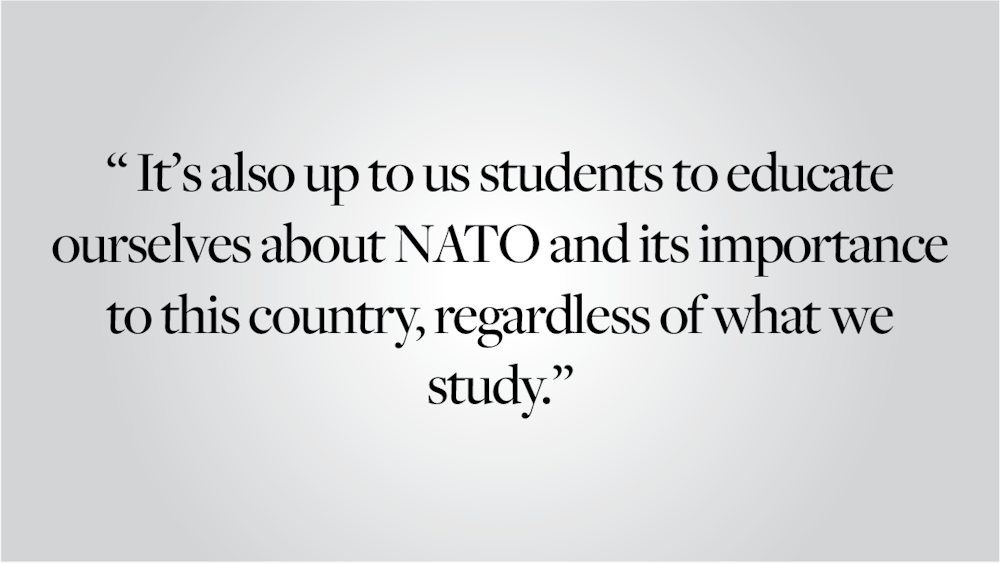This year, the North Atlantic Treaty Organization (NATO) turns seventy-five. In the course of its lifetime, NATO has seen the fall of the Berlin Wall, the end of the Cold War and, more recently, the Russian invasion of Ukraine. Indeed, NATO has played a key role in American and global geopolitics for the past three-quarters of a century, and Brown must take steps to educate students on this important — yet often overlooked — alliance.
NATO unity has recently seen strong challenges, especially from Donald Trump. As a major contender for the presidency — the alliance’s traditional leader — his views on NATO are beyond alarming. His disdain for the organization’s principles is nothing new, but this past week, he explosively announced at a rally that he would encourage Russia to do “whatever the hell they want” to any NATO member that has not met the 2% spending guideline.
Statements like these not only border on blackmail, but also directly call into question the integrity of NATO by placing doubt on American willingness to uphold Article 5, which states that an attack on one member country is treated as an attack on all. This is the founding principle of the organization and has long served as the main deterrent towards hostile actors, most recently, Russia. Trump’s latest statement directly implies that under his administration, a NATO country would not necessarily be guaranteed American defense if attacked by an aggressor.
Article 5 is of unparalleled importance to America’s allies because the reassurance that the US, the world’s foremost superpower, will defend them is enough to keep hostile states at bay. But Trump’s rhetoric is directly eroding this line of defense by directly calling into question the American commitment to NATO allies, potentially giving Russia and other hostile countries free reign to attack Western Europe. It’s not difficult to see the potentially disastrous consequences of fading commitment to NATO from the United States.
An even more concerning prospect is America’s potential withdrawal from NATO entirely, which is reportedly not as far-fetched as we might like to think. Trump allegedly ordered senior officials at the 2018 Brussels summit to do just that before pulling back the decision at the last minute. Even though an actual American withdrawal is unlikely, having a president that publicly disregards the role of NATO could be disastrous enough. Should there be even a slightest doubt of America’s commitment to NATO, the chance of war exponentially increases as Western Europe is largely left alone.
Given the importance of NATO’s integrity, opportunities to learn about NATO should be a priority at Brown, especially considering NATO’s role in the Russia-Ukraine war, which is nearing two years of conflict. We must also be more alarmed that Trump remains nationally competitive in the upcoming presidential election.
To address this, the Brown administration should create a course on the history of NATO, or perhaps even bring in Jens Stoltenberg, the Secretary-General of NATO, for an Ogden Lecture. It’s also up to us students to educate ourselves about NATO and its importance to this country, regardless of what we study. As students, we might not have the ability to significantly alter American geopolitics. But what we can do is ensure our own understanding of this important alliance, as one day we might be the ones shaping this country’s policies.
The loss of NATO’s integrity is not an option. Now more than ever, we cannot ignore the importance of this alliance and allow it to be utilized as a dispensable political pawn in foreign affairs.
Lucas Guan ’27 can be reached at lucas_guan@brown.edu. Please send responses to this opinion to letters@browndailyherald.com and other op-eds to opinions@browndailyherald.com.





